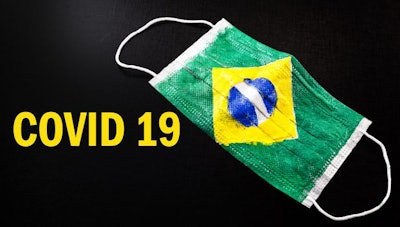
In an effort to ensure the health and safety of its team members between the months of March and June, JBS has invested over BRL100 million (US$19.34 million) in contingency health and safety measures, systems and processes at all its facilities in Brazil, the company announced in a notice to the market.
The resources were allocated to dozens of actions that are part of the prevention and protection protocol of more than 130,000 team members at the production units, distribution centers, offices and the company’s other premises in Brazil. During this period, to ensure the measures are implemented and effective, JBS has been conducting periodic audits in its 135 production units, verifying item by item of each action in its strict security protocol.
To define this protocol, JBS hired a medical consulting company of specialist infectologists, like Dr. Adauto Castelo Filho, and benchmark institutions like the Albert Einstein Hospital who validated each phase of the company’s protocol as per the medical and healthcare recommendations and the stipulations of Inter-ministerial Ordinance 19 (Ministries of Health, Agriculture and the Economy), dated June 18, 2020.
Furthermore, between March and June JBS hired more than 10,000 professionals nationwide to take the places of team members who had been preventatively kept at home. The objective of this was to protect those in the risk group, such as pregnant women and people over the age of 60. Part of this group is also composed of team members in situations of greater vulnerability, including indigenous people, and those under medical recommendation.
All team members testing positive for COVID-19 were also immediately given leave of absence and remain away from their posts until they have fully recovered. In all cases, the company’s healthcare team carries out permanent monitoring. Similarly, JBS said it engages in an active search among the staff, for those who may have been in contact with and family members.
JBS pointed out that it already monitors 100% of its team members on a daily basis, from when they begin their working day – from transportation, to access to the production units, including shift changes, intervals, and meals until they return home. This is conducted by anamnesis, temperature measurement or laboratory consultation.
“The procedures and precautions adopted by JBS at the plants are capable of providing its team members with maximum protection and are comparable to those in place at several benchmark hospital institutions,” Dr. Castelo said.
Examples of the measures adopted are:
- A 49% expansion of the bus fleet. To impose distancing rules when transporting team members, JBS has expanded the number of buses serving the round trip from units throughout Brazil – more than 1,800 vehicles that transport team members who now occupy marked and fixed seats, with a distancing between every two seats. In addition, more than 2,000 digital thermometers have been purchased to take the temperature of the team members upon entering the bus and the plant; they all also undergo anamnesis before accessing the vehicles.
- New PPEs (personal protection equipment). Besides the uniforms already used under industry sanitary and operational protocols, all JBS plants have been equipped with new protective equipment such as acrylic face shield masks, disposable and cloth masks. The use of masks is 100% mandatory in all areas of the company. Over 180,000 face shields alone have been acquired in the last three months. In all, over 1.2 million PPEs have been purchased. All this equipment is used during the entire shift of the team members, while those on the production line also have physical protective barriers that guarantee physical and social isolation between them.
- Detergents and sanitizers. To ensure proper hand sanitization everywhere in the company, over 150,000 liters of isopropyl alcohol gel were purchased, and were made widely available from foot-operated dispensers at various easily accessible locations. Disinfection of the installations and buses has been intensified – with monthly consumption of more than 200,000 liters of disinfectant products.
- Free vaccination against H1N1 for 100% of the team members. The health and safety departments at JBS have facilitated H1N1 vaccination of team members at all of its Brazilian facilities.
- Hiring of healthcare professionals. The team of healthcare specialists at the production units has over 630 professionals which has grown more than 40% when compared to the number verified before the pandemic. An additional 192 professionals have been added to the team, including doctors, nurses and assistants for round-the-clock attendance to team members.
Other protective measures
In addition to these measures, changes have also been made to the structure at the plants. Investments in equipment, facilities and new areas include:
- Creation of additional lunchrooms that allow for distancing between team members, avoiding crowding;
- Additional external outpatient areas attached to plants and which operate full-time;
- Expansion of covered rest areas, such as tents and/or containers with more distancing between seats.
Communication about the safety and healthcare protocols in place at the production units, as well as general information about Covid-19, has been intensified. At each plant, at several points of contact and transit there are informative and awareness notifications about the measures and attitudes required for preventing the disease at work, as well as clarifications to enable team members to protect themselves and their families when at home and on rest days. The tools used include spots on the internal radio, videos, signposting and distancing alerts, noticeboard and the intranet, among others.
In addition to the investments of BRL100 million made internally in all its plants in Brazil, JBS has announced the donation of BRL 400 million to the fight against COVID-19 in Brazil. The funds will be allocated on three fronts: healthcare, social action, and science.
The company says it is confident that all these measures are effective in protecting against and controlling COVID-19 at its facilities and in ensuring the supply and offering of the highest quality products to its clients and consumers in Brazil and worldwide. This is a mission that cannot stop since food production is one of the essential activities for the population in the context of the COVID-19 pandemic.
View our continuing coverage of the coronavirus/COVID-19 pandemic.
















